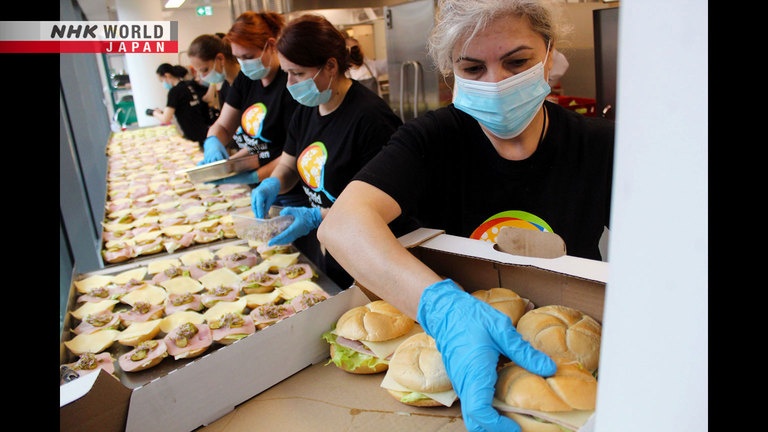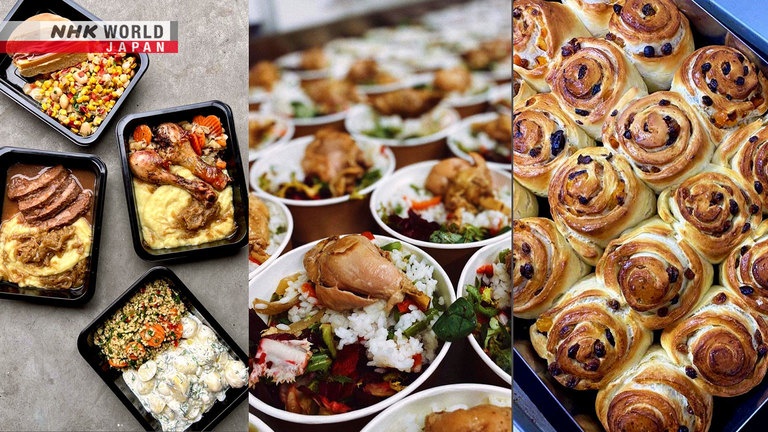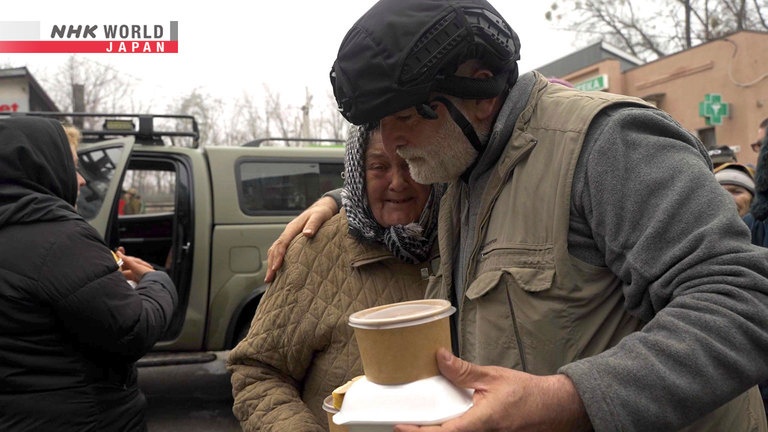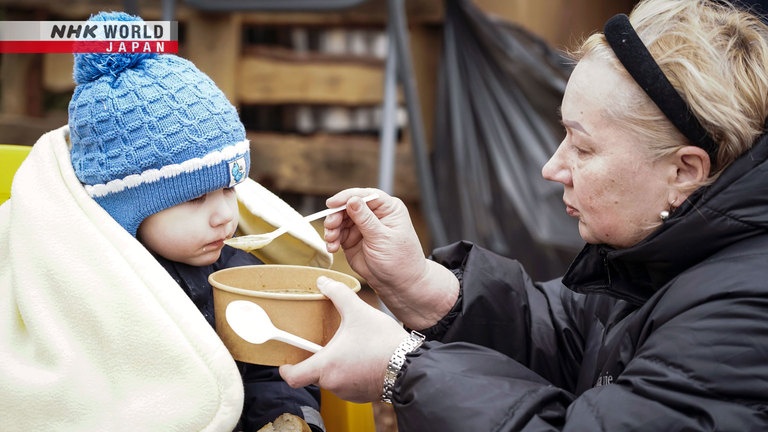Changing the World Through the Power of Food: José Andrés / Chef/Founder, World Central Kitchen
Award-winning chef José Andrés is the founder of World Central Kitchen, a non-profit organization supporting people in disaster areas with fresh food. He shares his passion for humanitarian work.




Transcript
Direct Talk
In the country of Ukraine and
at the borders of neighboring countries,
there is a non-profit organization
serving meals to the people.
It's called World Central Kitchen.
This humanitarian organization
was founded by Jose Andres,
an award-winning chef
with a two Michelin star restaurant.
Today he shares with us
his passion for feeding others.
Because we do respect Ukrainian people,
and we want to be next to them.
No idea was too crazy for us.
We've been putting
a lot of different systems,
that we can promise that food
will not be one of the problems
that Ukrainians are gonna be facing.
In the short term, in the emergency,
the men and women of World Central Kitchen,
we've been there
next to the people
that need the food the most.
That's very simple.
Big problems have very simple solutions.
Show up, boots on the ground,
and start cooking,
and start feeding.
Changing the World Through the Power of Food
Medyka, Poland
March 2022.
The village of Medyka in Poland
turned into a busy border crossing,
with displaced Ukrainians
fleeing the warzone.
World Central Kitchen was there,
preparing hot meals for them day and night.
The day that the
Russian forces invaded Ukraine,
a small team of World Central Kitchen
landed in Poland,
and we began doing what we always do.
Let's just start feeding people.
Why?
Everybody was leaving Ukraine,
especially mothers, children.
Family in Deutschland.
So you are going to go to them now?
Yeah.
The temperatures were freezing cold,
under 10, 20 Celsius degrees.
And sometimes people will drive,
not only for hours but for days,
or wait in line to cross the Ukrainian border
into Poland or into the other countries
welcoming the refugees.
That's where we began.
Andres joined his team in Poland
to cook for refugees
and report on the situation on the ground.
So…guys I'm here in the town of Medyka,
the southern part of the border of Poland.
Here is where we have
the World Central Kitchen feeding facility.
There is this route
that people come from Ukraine.
Ukraine is like 500 meters in my back.
You're gonna see
that people don't stop arriving.
World Central Kitchen was founded in 2010.
Andres and his team
have provided meals in disaster areas
including Tonga, Haiti,
Puerto Rico, and the Bahamas.
To date they've served
more than 70 million meals worldwide.
Bananas are the perfect food.
Why?
Because you peel them.
They're clean.
The fruit that comes with its own container!
The team at World Central Kitchen pours
their heart and soul into their cooking.
They make it a point to serve up dishes
that the local people are familiar with
– true comfort food.
Thank you very much.
Danke Ihnen.
Merci beaucoup.
Gracias.
Food is a gift we receive from the let go,
once we come out
from the womb of our mothers.
And I believe that attachment
with food remains with us forever.
That's why we love to
share a table, our home.
As of May 20th,
they've provided 26.6 million meals in Ukraine
and in 7 neighboring countries
since the war began.
We began being a bridge.
More than 64 days into the war,
we've done more than
10 million pounds of food we moved.
By the time everybody sees this,
it'll be so much more.
We've done close to
20 million hot meals all across Ukraine
We have the 400 restaurants I told you,
we are in more than 100 cities,
we are in 40 train and bus stations.
We are in 800 shelters,
we have more than 10,000 volunteers.
But you see?
Every day, every day, every day.
Jose Andres was born in 1969
in the Spanish town of Mieres.
Growing up, his father taught him
life lessons for the kitchen and beyond.
My father, even (though) he was a nurse,
he loved to cook.
And my father always told me
about controlling the fire.
He never let me do the cooking,
he would only (make me) help
make the big fire with the wood underneath.
This very big paella pan.
One day, I wanted to cook, and my father
sent me away because I got very upset.
He said
"No, I need you to help me with the fire."
And my father got me on the side and told me
"My son,
I know everybody wants to do the cooking,
but the most important thing
is making the fire,
controlling the fire."
"And once you master the fire,
you can do any cooking you want."
This was a metaphor for life.
We all must know our fire.
We all must control our fire,
and then we can do
any cooking you want in our lives.
In a way, this is what I've been doing.
I have a profession, which is cooking.
Me and my restaurants, and feeding people.
But if we all think,
that profession, that thing we love,
it's something that can allow us to do
even more than we have ever dreamed.
Andres moved to the U.S. at the age of 23,
and eventually opened his own restaurant
in Washington, D.C.
He became known for culinary creations
based on "molecular gastronomy,"
blending scientific principles
with fine dining.
He's since opened a range of restaurants
to widespread acclaim.
In recognition of his humanitarian work,
"Time" magazine named him
one of the 100 most influential people
in the world in 2012 and 2018.
TIME 100: Most Influential People 2012, 2018
Back in 2010, Andres visited Haiti
after a catastrophic earthquake.
He saw that governments are often slow
to respond to emergencies.
The way sometimes countries handle
humanitarian aid within the country
or how big organizations help other countries,
it is sometimes
the helicopter mentality like
you arrive,
you bring something,
you drop it, you leave,
and maybe you never come back again.
That's it.
It doesn't happen that way.
When we arrive one day
and we bring food with us,
we don't do assessments.
After a hurricane, an earthquake,
let me tell you –
people are going to be hungry.
You do the assessment
as you go, as you bring food,
as you find the leaders
sometimes maybe the mayor.
You see one person that kind of
takes leadership and begins on their own.
Putting some water,
gathering some food and start helping.
When we identify those people, we know
those are the people who we want to be with.
Andres believes that
local support is essential
when it comes to providing relief.
What is the key to
working with local communities?
Because I believe that locals know best.
And what, even we (who) come from the outside
very quickly we as an organization
make sure that we support the locals,
because they are gonna help us
help them quicker and faster.
And that's it, we show up every day,
we keep popping (up) in more places.
People know we are there,
we began getting calls.
We began getting (messages through) twitter,
through social media.
We need food in this town,
we need food in this church,
we need food in this hospital.
And we get all this information,
and in real time,
and we go and we deliver.
This is our friend Victor,
he is the master running this bakery here.
They are making amazing bread here.
It smells amazing.
These are the heroes of Ukraine too.
There's many ways to fight the war.
Oh my god, look at this.
Oh my god, it smells so good!
So warm.
Thank you. Ukraine!
Despite their experience
working in disaster areas,
entering a war zone
was particularly dangerous.
Andres and his team
went to the city of Bucha,
where many civilian casualties
had been reported.
Bucha, Ukraine
The city was in ruins.
Bucha, Ukraine
No relief supplies had been delivered
to the area in almost a month.
Careful here, okay?
The day I went there, we had mines.
We had maybe still Russian snipers,
we don't know.
But we had to be there. Why?
Because those people had been there
for more than 30 days.
They will be shot only by
leaving their homes trying to find bread.
We had to be next to them.
You good? Ya, ya.
We were feeding shelters, train stations.
But very quickly we realized that
the big problem was inside Ukraine.
Just as a message that
somebody is caring for you,
somebody is gonna be next to you.
Every day things will get better.
Don't give up, keep working hard.
Because we cannot afford anybody giving up.
Thank you. Thank you.
Thank you.
Andres and World Central Kitchen
post pictures and videos of their efforts
on social media almost every day.
They receive countless replies of
appreciation and encouragement
from all over the world.
Whenever and wherever disaster strikes,
they are ready to help those in need.
In the way I see it,
every restaurant in the world
is a part of World Central Kitchen.
In the way I see it,
every cook around the world
is part of World Central Kitchen.
Every warehouse that has fruits
and vegetables and meat
is part of World Central Kitchen.
Because once the situation happens,
very quickly, I can start,
oh, my God, I need this restaurant.
We already contact them.
"Can we use your restaurant?"
Yokohama, Japan
In February 2020,
a COVID-19 outbreak was discovered
on the cruise ship Diamond Princess
in the Western Pacific.
The ship was quarantined
in a Japanese port for 14 days.
Andres dispatched a team to support them.
I called my friends.
Who did I call?
I called chef Nobu Matsuhisa.
He is my friend, and I was sure
he would provide me with people,
with kitchens, and could be helping us.
In a moment,
that cruise ship needed to be fed.
A place to work,
a place to partner with locals,
and take care of the problem very quickly.
With the help of local volunteers,
World Central Kitchen was able to
provide meals to the passengers
within 48 hours of Andres's call.
In the months that followed,
the organization provided meals to
healthcare workers, families, and others
impacted by the COVID-19 pandemic.
In 2020, they served up
more than 40 million meals worldwide.
Guys, say "Hi" to the world!
World Central Kitchen is now one of the
world's largest humanitarian organizations.
When it comes to
keeping projects running smoothly,
Andres believes in equality
within an organization.
You know who the boss is.
The boss should not be the person
who has the title behind the door.
The boss should be the person
that has their boots on the ground.
In this case of the emergency.
A person that is there next to the people,
watching (in) real time what's going on.
That's why organization is much smooth.
From being so like mountains,
and more
like flat.
What words does Andres live by?
Food is love.
Longer tables, not higher walls.
The longer tables – where that love happens.
No higher walls.
Walls only separate countries
and people one from each other.
We all need to invest in longer tables.
What is good for me must be good for others.
If everybody's enjoying
the goodness of the earth,
you don't need walls
because you don't need
protection from anybody
because everybody is doing fine.
So the walls are not gonna solve the problems
that we face in the world,
but the longer tables will.
Let's make sure that this means something.
Boots on the ground, making it happen.
That's what this means.